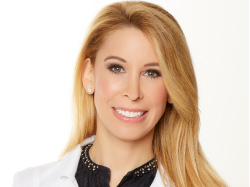HEALTHY MOUTH, HEALTHY BODY
The Silent Shift: How Menopause Impacts Your Teeth
and Gum Health
Menopause is a natural part of aging. While hot flashes, mood swings, and changes in menstrual cycles are well-known symptoms, one lesser-discussed, yet important, area it affects is oral health—particularly teeth and gums. ONE in four women will lose a tooth in the first five years of menopause due to gum and bone loss! As hormone levels drop, especially estrogen, a major impact can happen.
HORMONAL CHANGES
AND ORAL HEALTH Estrogen plays a vital role in maintaining the health of bones—including the jawbone that supports your teeth—and mucous membranes like the gums. During menopause, declining estrogen levels can lead to several dental issues, such as: dry mouth (xerostomia), gum inflammation (gingivitis), increased risk of periodontal disease, bone loss, tooth sensitivity and mobility.
These symptoms may creep in slowly but can become quite noticeable over time, especially if dental hygiene isn’t a top priority.
DRY MOUTH:
A COMMON AND DISRUPTIVE SYMPTOM One of the most prevalent oral symptoms during menopause is dry mouth. Saliva isn’t just there to keep the mouth moist; it’s essential for washing away food particles, neutralizing acids, and preventing bacterial overgrowth. When saliva production decreases due to hormonal changes, your risk for cavities, gum disease, and oral infections increases. Women can complain of burning mouths, difficulty swallowing food, and bad breath.
GUM DISEASE AND BLEEDING GUMS
Hormonal fluctuations can make gums more sensitive, red, and prone to bleeding—even with routine brushing and flossing. This inflammation can be an early sign of gingivitis, which, if left untreated, may progress into periodontal disease.
Periodontal disease is a serious gum infection that damages the soft tissue and can destroy the bone that supports your teeth. In postmenopausal women, this risk is significantly increased due to reduced estrogen and, consequently, decreased bone density.
BONE LOSS AND TOOTH LOSS
Osteoporosis is commonly associated with menopause, and the jawbone is no exception. As bone density diminishes, the structural support for teeth weakens. This can lead to loose teeth, shifting of teeth and an increased risk of tooth loss.
Studies show that postmenopausal women with osteoporosis are three times more likely to experience tooth loss compared to women without bone loss.
BURNING MOUTH SYNDROME
A lesser-known condition that may arise during or after menopause is burning mouth syndrome (BMS). It causes a painful, burning sensation in the tongue, lips, and other areas of the mouth, often without any visible signs. Though the exact cause is not fully understood, hormonal changes are believed to be a contributing factor. BMS can be frustrating and negatively impact quality of life, especially when paired with dry mouth.

WHAT YOU CAN DO TO PROTECT YOUR
ORAL HEALTH
The good news? While menopause can affect your teeth and gums, preventive care and lifestyle changes can go a long way in maintaining a healthy mouth.
Here are some tips:
• Stay hydrated: Drinking water frequently can help relieve dry mouth and flush away food particles.
• Good oral hygiene: Brush twice daily with a ph balanced toothpaste with minerals like hydroxyapatite that can strengthen teeth and help with sensitivity and floss daily. I recommend intelliWHiTe Hap 10 + super paste or Smile Saver.
• Visit your dentist regularly: A dentist can detect early signs of gum disease or bone loss and suggest treatment options.
• Eat a bone-friendly diet: Foods rich in calcium and vitamin D help maintain bone density.
• Consider hormone therapy: For some women, bioidentical hormone replacement therapy (HRT) may help reduce symptoms of menopause, including those affecting the mouth.
FINAL THOUGHTS
Menopause is a significant life transition that impacts much more than reproductive health. Paying attention to oral symptoms—like dry mouth, bleeding gums, or increased tooth sensitivity—can help you catch problems early and protect your smile for years to come.
If you’re approaching or going through menopause speak to your dentist about keeping your oral health up to par when navigating these hormonal changes.
In Good Health,
Dr. Jennifer Jablow
For more information on Dr. Jennifer Jablow,
visit DoctorJablow.com
You can send your questions or a subject you would like to see covered in a future story
to docsmilez@gmail.com





